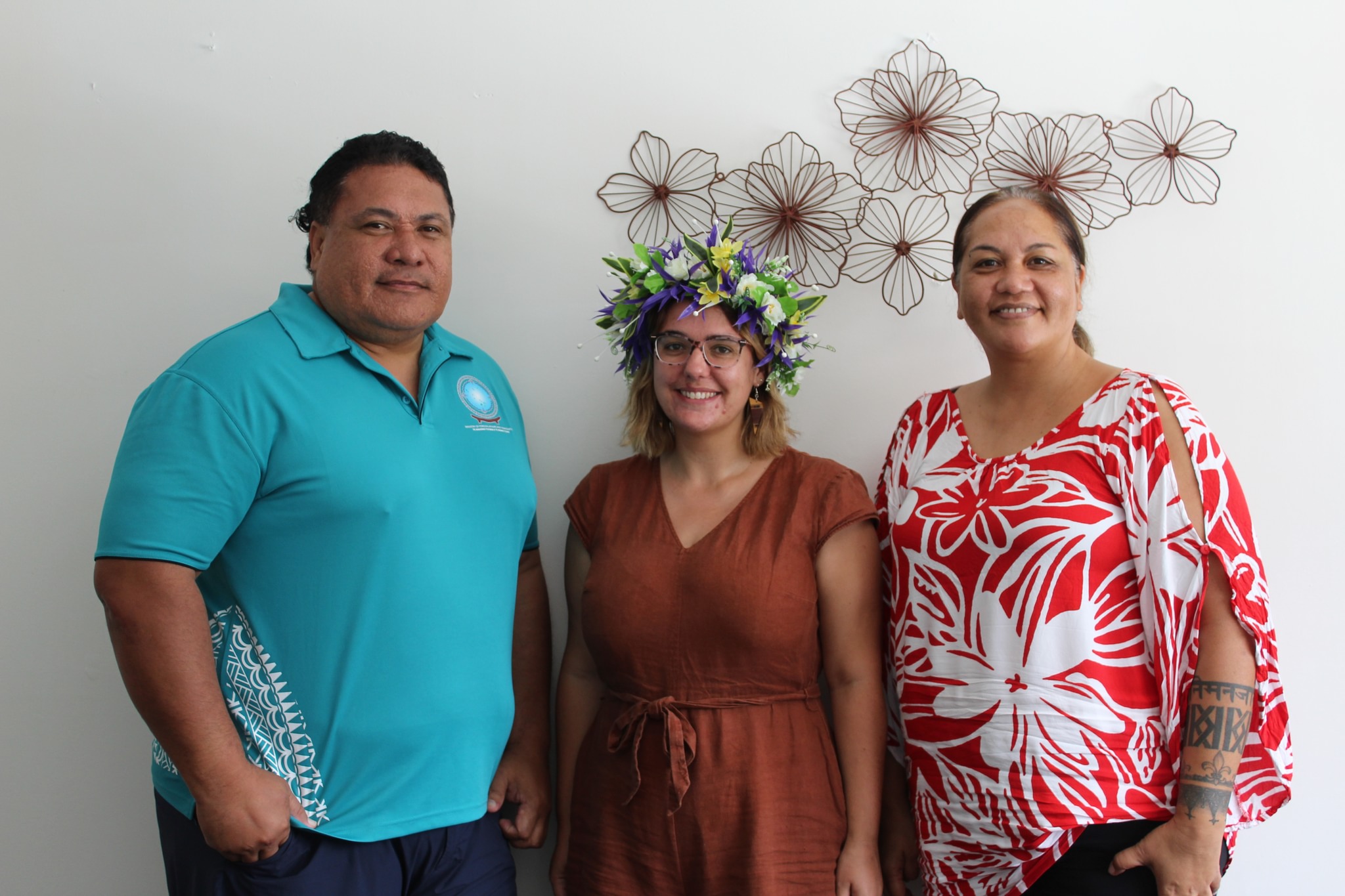Researcher examines criminal deportations to Cook Islands
Tuesday 9 May 2023 | Written by Supplied | Published in Features, In Depth

MFAI senior immigration compliance officer Tereroa Pumati (left) with researcher and PhD candidate Henrietta McNeill (middle) and MFAI acting principal immigration officer Chere Arthur (right). MFAI/23050807
The Ministry of Foreign Affairs and Immigration (MFAI) last week hosted and assisted researcher Henrietta McNeill, a PhD candidate with the Department of Pacific Affairs at the Australian National University, with fieldwork in the Cook Islands. McNeill was researching criminal deportations to the Cook Islands, Samoa and Tonga as part of her PhD studies.
With the Cook Islands chairing the Pacific Islands Forum this year, her research is timely as the Leaders Boe Declaration Action Plan highlighted “the increasing prevalence of criminal deportees coming back into their country of origin with relatively no support”, MFAI said in a statement.
McNeill said she had a very productive research visit to Rarotonga and Aitutaki, and is extremely grateful to MFAI for their assistance and hospitality as her in-country research counterpart, all the people she had interviewed, including deported people who have shared their stories, and the Prime Minister’s Office for facilitating the research permit process.
“The majority of deportations to the Cook Islands are from Australia and have increased since amendments were made to section 501 of Australia’s Migration Act [1958] in 2014,” said McNeill.
“As New Zealand passport holders, Cook Islanders convicted of crimes can either be deported to New Zealand or the Cook Islands. As a result, the Cook Islands has a low number of deported people residing here.”
While there are regional concerns that those who have been away for extended periods may have trouble fitting in, McNeill said most people she spoke to in the Cook Islands were getting on with their lives, had jobs, family, and church support.
McNeill added there were some financial difficulties for some, particularly those who were not living with family, and she recommended that further counselling be made available for those who have arrived, as deportation can be a traumatic event.
She stated she was also impressed at the rehabilitation approach taken at Arorangi Prison, which focused on cultural reintegration and skills for employment after an inmate’s release.
McNeill is due to submit her PhD later this year, which is funded by an Australian Government Research Training Grant Programme Scholarship.
MFAI Secretary Tepaeru Herrmann welcomed the research being done by McNeill and anticipates its findings and recommendations will contribute to the Cook Islands’ forward policy considerations relating to deportees to the Cook Islands.
“MFAI welcomes McNeil’s inclusion of the Cook Islands in her research on criminal deportations to Polynesia,” said Herrmann.
Herrmann said the Cook Islands had a small number of criminal deportees residing here, adding while some had assimilated with family support, others had committed further crimes in the Cook Islands, in some cases of a profoundly serious and significant magnitude.
Criminal deportations to the Pacific have risen significantly in the last decade. These deportees, who are mostly male, are being sent back to their country of citizenship in the Pacific, primarily from the United States, Australia, and New Zealand.
In commentary issued by McNeill and Magele Mackenzie via the Asia and Pacific Policy Society in February 2022, they note that the Pacific Transnational Crime Network has assessed criminal deportees as a threat to regional security for over five years.
Deportees sent to Samoa, Tonga, the Cook Islands, Fiji, the Federated States of Micronesia, and the Marshall Islands have often been offshore for decades and have limited language skills, cultural understanding, and social connections to the country of their citizenship.
In some neighbouring Pacific countries, the scale of the problem is of such a magnitude that it requires, in MFAI’s view, a regional response.
“The United States, Australia, and New Zealand need to take more responsibility and provide resourcing support towards Pacific Islands Countries where they are exporting criminal deportees,” said Herrmann.
“MFAI looks forward to the insights and recommendations McNeill’s research will produce to assist with these national and regional considerations.”




















































